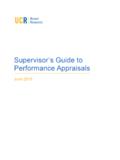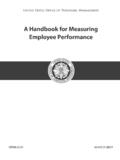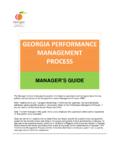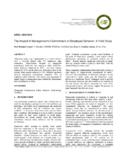Transcription of Employee Brief: Your Self-Assessment
1 1 Employee Performance Management Process August 2012 Employee brief : your Self-Assessment This brief is provided to help document your Self-Assessment and think about your 2011-12 performance. 2 PURPOSE The purpose of this document is to: Provide instructions for completing your Self-Assessment Help you understand the rating process Supply tips on how to best document your performance to show the impact of your contributions over the past year Note: The Self-Assessment must be completed by anyone with more than 6 months service by August 27th. Employees with at least 90 days of service are encouraged to document accomplishments and key learnings as a basis for goal-setting *What is a Norming Process?
2 The norming process facilitates consistency and fairness in overall performance ratings within and across departments. It includes the following steps: Senior Leadership Team meeting to discuss and norm ratings for their direct reports. Each Senior Leadership Team member cascades a norming process within their organization. The distribution of performance ratings across managers is reviewed by department leadership. A final review is conducted by the Senior Leadership Team. Key Dates Employees submit self -assessments to managers: by Aug 27 Managers complete draft evaluations: by Sept 9 Department norming process*: Sept 11 Sept 19 Senior Leadership Team review: Sept 24 Performance evaluation meetings: Sept 25 Oct 12 Resources Website: Contact your manager, HR Partner, or a member of the EPMP team at You can reach EPMP Manager Pam Tanner directly at 3 HOW TO GET STARTED (EMPLOYEES) INSTRUCTIONS Employee Self-Assessment 1.
3 Review this brief for detailed instructions on how to document your Self-Assessment , guidance on how to think about performance, and examples of documentation. 2. Copy your goals for 2011-12 into the Individual Goals section of the form. If you do not have documented goals, document your actual results in the Results boxes. You do not need to backfill Goal Statements or Performance Indicators , but reference appropriate performance indicators in documenting results. 3. If you identified any Additional Performance Factors or areas of focus for Success Factors or People Management at the beginning of the year, copy those into the appropriate section of the form.
4 4. Document your assessment of goal achievement and impact in the Employee Comments fields for each goal; success factor; people management section and additional performance factors (if applicable). 5. Be sure to complete all applicable sections of the form. You can provide overall comments on your performance on the Year-End Performance Summary page; it is optional. The rest of the form, including your comments on the performance review and signatures, will be completed in your Performance Review session. 6. Save a copy of your Self-Assessment on your computer or in a network folder. 7. Complete your Self-Assessment by emailing it to your manager by August 27, 2012.
5 4 HOW TO GET STARTED (MANAGERS) INSTRUCTIONS Manager Evaluation 1. Review the performance evaluation form for instructions regarding how to document your evaluation. 2. For each section of this performance evaluation form: a. Review the Employee s Self-Assessment . b. Document your evaluation in the Manager Comments fields. Build upon the Employee s Self-Assessment and/or note, specifically, any areas where your evaluation differs from the Employee s assessment and why. c. Apply a performance rating in the Manager Ratings fields using the specific rating scale for each section. 3. Be sure to complete all applicable sections of the form. The rest of the form, including the Employee s comments on the performance review and signatures, will be completed in the Performance Review session.
6 4. Complete a draft of all Employee Performance Reviews by September 10 for norming sessions to be conducted September 11-19. your department head will provide more details regarding the time and location. 5. Once norming sessions have been held and ratings finalized by the Senior Leadership Team, meet with your Employee to hold a Performance Review and Goal Setting Session between September 25 and October 12. 6. In the Performance Review and Goal Setting Session, discuss the Employee s and your views on the Employee s performance. Provide the Employee an opportunity to write comments in the Year-End Performance Summary. 7. Print and sign the finalized performance review.
7 Be sure to get the Employee s signature as well. 8. By October 31, please print and interoffice mail the completed performance review to: Pam Tanner, Human Resources, Room 501, 900 Grant Street. 5 THE PERFORMANCE RATING PROCESS When rating these aspects of performance: Goal Achievement or Other Performance Factors Success Factors* or People Management These scales will be applied: EX Exceeded RM - Role Model ME Met FP - Full Proficiency PM Partially Met DE- Developing DN Did Not Meet NI - Needs Improvement *Click here to review Success Factors (or see Appendix) When Overall Performance is rated, this scale will apply: Level Rating Definition 5 Results and Impact Exceed Expectations Impact exceeds expectations for the role.
8 Makes exceptional contributions through superior performance on key goals; role model in demonstrating DPS Success Factors. Demonstrates high degree of skill and competency. 4 Results and Impact Fully Meet Expectations Makes significant contributions and impact by meeting key goals and performance indicators and demonstrating full proficiency in DPS Success Factors and critical job skills. 3 Results and Impact Generally Meet Expectations; Opportunity to Expand Impact Solid contributor who generally meets goals but could expand impact in their role. Further consistency, demonstrated impact in key areas, or development in DPS Success Factors is required to realize full potential within the role.
9 Demonstrates the willingness and ability to grow. 2 Results and Impact Need Improvement Impact is below that expected for the role. Results do not meet expectations for experience and job level. May have missed an important goal or goals, or require different development in a key skill area or Success Factor. Short-term performance development plan is required. 1 Results and Impact Are Unsatisfactory Did not meet key goals and/or does not demonstrate proficiency in critical job skills or DPS Success Factors. Immediate and significant performance improvement is required. Performance Improvement Plan with specific timeline (generally less than 6 months) is required. Based on feedback that it was difficult to apply the overall rating scale to individual goals, Success Factors and other performance factors, there are now three separate rating scales, as described below.
10 The overall rating scale focuses on results and impact. 6 HOW TO THINK ABOUT your PERFORMANCE Our shared goals as an organization that we close our achievement gaps and put every child on a path to graduate from high school prepared for college and career are stretch goals. We will only achieve our district goals if every Employee challenges him/herself to set and achieve ambitious goals which move the bar in a significant way. The Employee Performance Management Process (EPMP) is intended to be a transformative process that propels the district forward in meeting its goals. Click here for the following FAQs (or see Appendix): Q: Why did the rating process change in 2010-11?






